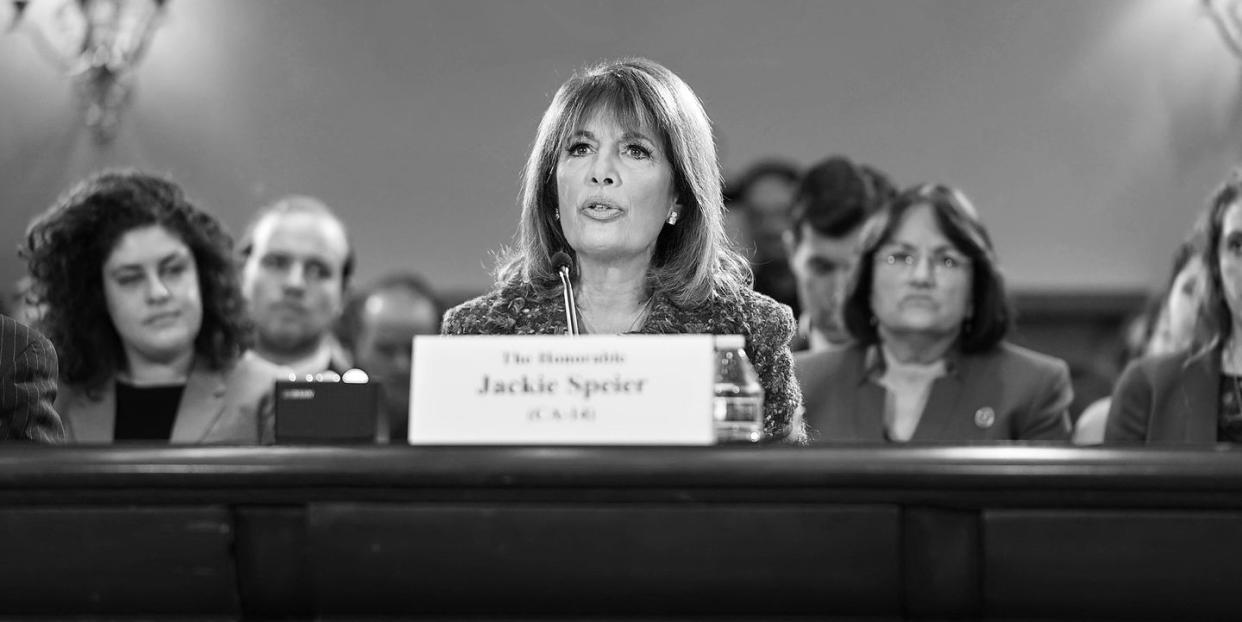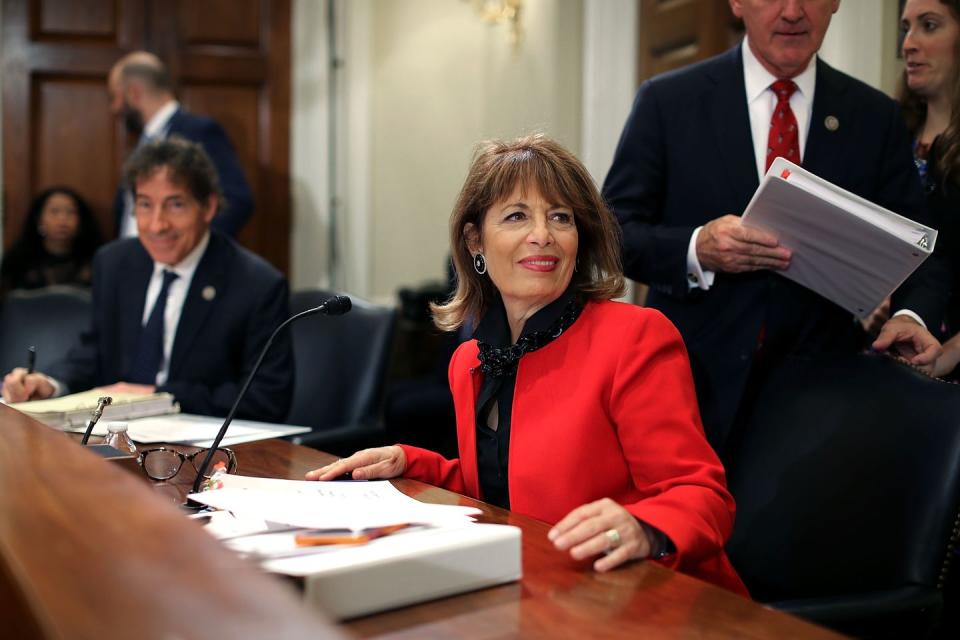Jackie Speier Could've Lost Her Life. Now, She's Helping Women Reclaim Theirs

In 2011, Jackie Speier revealed, on the floor of the U.S. House of Representatives, that she had once had an abortion. Decades earlier, the California congresswoman was 17 weeks pregnant when the fetus slipped from her uterus through her cervix down to her vagina. When her doctors couldn’t move it back up, they realized the fetus wouldn’t survive and terminated the pregnancy. Speier and her husband desperately wanted the baby, and the experience was shattering. Despite her devastation, she says the ordeal gave her the perspective to fight for other women who can’t share their own stories.
Speier, who’s 69, has long been a proponent of women’s equality—she says she’s been a feminist “since the day I was born”—and has made combating sexual assault, as well as access to reproductive health care, a priority in office. She started her career in politics early, working as an aide to California representative Leo Ryan in her twenties. It was on a trip with the congressman to cult leader Jim Jones’s remote compound in Jonestown, Guyana, that her life changed forever: She was shot five times at point-blank range and left for dead for 22 hours. Though Ryan was assassinated in the gunfire, Speier miraculously survived. She went on to serve in the California legislature and, in 2008, won the seat in Congress that Ryan had once held.
In May, just days after Alabama passed a restrictive abortion law that rocked the country, Speier spoke to ELLE about her emotional decision to divulge her own abortion, surviving Jonestown, and what Capitol Hill is really like behind closed doors.

ELLE: How did you summon the courage to talk about your abortion on the House floor?
Jackie Speier: I didn’t intend to do so. It was during a debate on legislation put forward by Republicans to defund Planned Parenthood. We were debating second-trimester abortions. [New Jersey representative] Chris Smith was reading from a book that talked about [doctors] sawing off limbs [during abortions], and I just became outraged. Because first of all, what does he know about that? Secondly, I had a second-trimester abortion, and none of that happened. I finished speaking, and I was trembling. I was just shaking. [Georgia representative] John Lewis came up to me with tears in his eyes and said, “You know, that’s one of the most powerful speeches I’ve ever heard on this floor.”
What were other reactions to your sharing that story?
It gave voice to a lot of women who have been shamed for no reason. This happens because there was a complication or issue. And yet society has put this horrible stigma on it. Unless we are willing to start regulating sperm coming out of men’s penises, I think it’s time to stop regulating what goes on in a woman’s uterus.
You mention becoming outraged at a congressman for talking about abortion. What role do you think men should play in this conversation?
None. If we’re going to start legislating around vasectomy, should a woman have the authority to have a vasectomy reversed on a man?
And yet so many men are behind the legislation restricting abortion in Alabama, Georgia, and other states. How worried are you about the future of abortion access in America?
The Alabama bill was made as extreme as it was intentionally, because they want to test it in the Supreme Court. Most of these laws that have been passed are so extreme, they’re indefensible. How is it a doctor can serve 99 years in prison in Alabama if he or she does an abortion, and someone who rapes a woman might do less time? I think every woman and man should be worried. Women are not chattel. We are not property. This takes us to a time when women were considered chattel. I mean, it wasn’t so long ago that women couldn’t serve on juries, that they couldn’t get their own credit card without having a man sign for it. It’s yet another effort to try to control women.
Do you see any hope in this current climate for people who support abortion rights?
I think it is one of those tipping-point moments. I expect that you’re going to see heightened engagement among younger women. For the most part, they have been untouched by this issue. It’s been women in their sixties and seventies who have dealt with it, because it’s been settled law for almost 50 years.
You championed legislation to combat sexual harassment on Capitol Hill, which the president signed into law in December. Why did you take up this issue?
[When I worked for Leo Ryan,] this chief of staff forced himself on me. He kissed me and stuck his tongue in my mouth. I recoiled. I went through all the emotions that every woman goes through. “What did I do to cause this? What signal did I give that he thought he had the right to do this to me?” We always end up taking responsibility for the conduct of someone else that was egregious and self-initiated. I went public because I wanted women staffers in Congress to feel comfortable coming to me. The stories I heard were so much more graphic and disgusting, I must say. There are women who are dealing with sexual harassment that goes on day in, day out. And we had a culture that basically looked the other way. That isn’t going to happen anymore.
How do you in good faith urge victims to come forward with these stories when a man who has been accused of sexual assault is in the White House?
The president is an aberration, and we need to recognize that this was just an accidental president who has created a horrible set of circumstances throughout his presidency. His behavior in and out of the White House has been repugnant to me, and I think repugnant to women across the country. But that is no reason for us not to come forward. He’s been president during a time when we passed the [sexual harassment legislation], and he signed it. Ironically. I should probably get a copy of it.
What is it like to be on Capitol Hill right now, at the epicenter of this divisive, ineffective government? What is the tone behind closed doors with Republicans?
When you get a quiet moment with them, they roll their eyes, they shake their heads. But they’re intimidated by [Trump].
You were shot five times in Jonestown, Guyana, and left for dead. How did that experience change you?
I should have lost my life there. I was so badly wounded that doctors didn’t quite understand how I did survive, especially without medical attention for 22 hours. But when something that grotesque happens to you at a young age, you reevaluate life. And for me, it made me feel like there was sand slipping through an hourglass and I was running out of time. I live my life as if I’m running out of time. I don’t want to waste a minute. When you look death in the eye, you’re not as fearful. There’s a fearlessness in terms of taking on issues, which is a silver lining. It empowers you.
It’s been a few months since the wave of women who were elected in 2018 joined you in Congress. What have you learned from them?
The sooner they take over, the better.
This article originally appeared in the August 2019 issue of ELLE.
You Might Also Like

